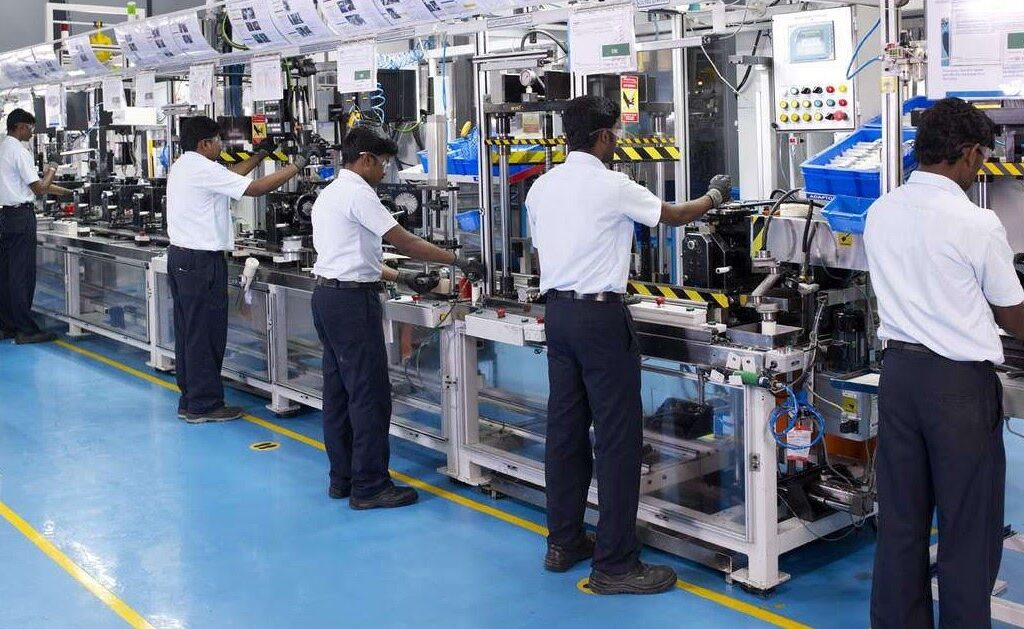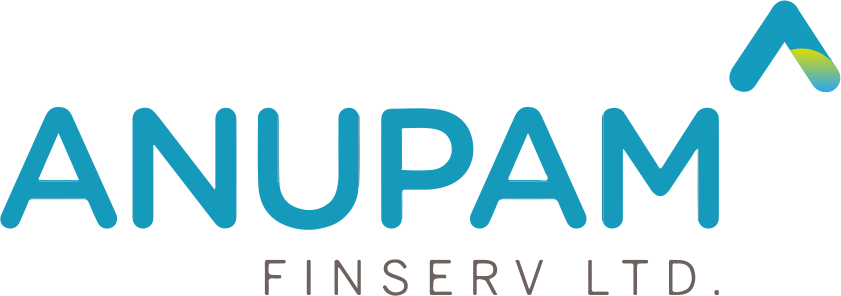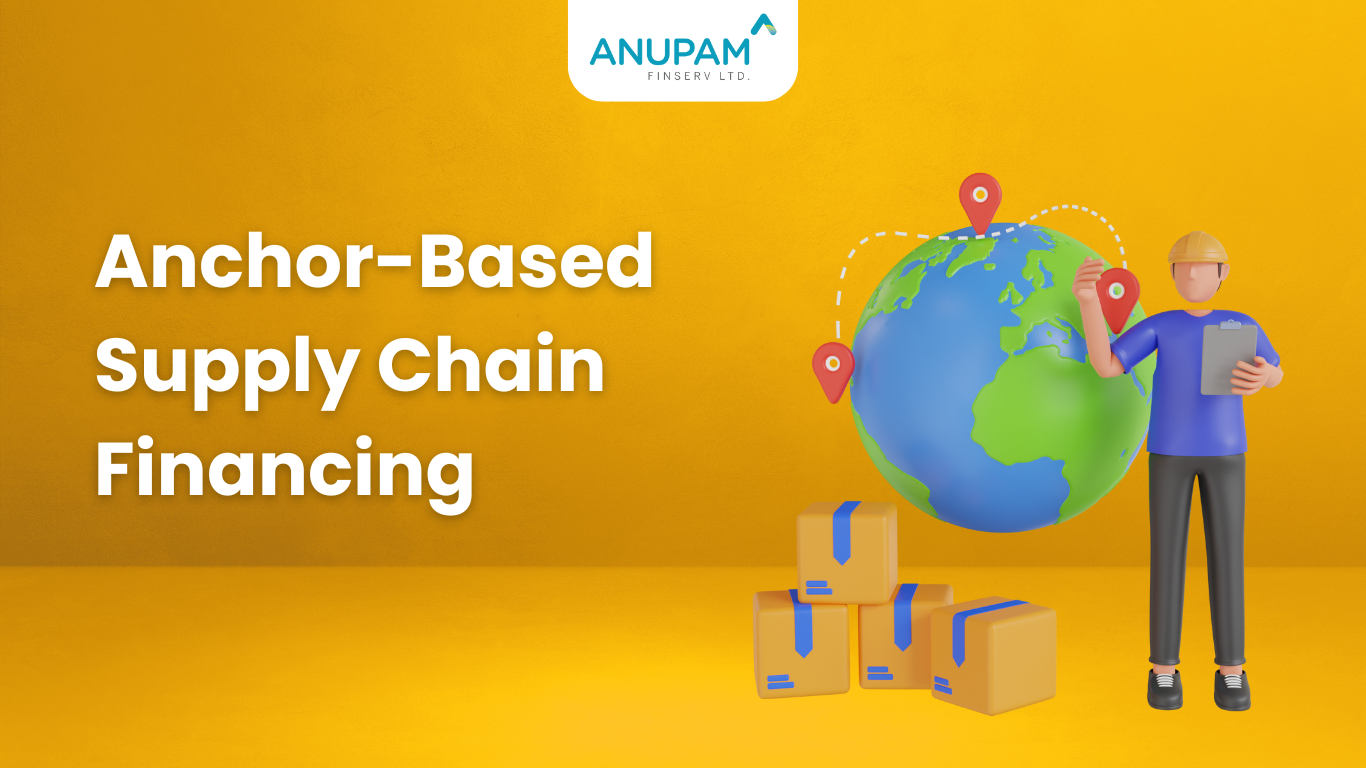Introduction to Anchor-Based Supply Chain Financing
In today’s dynamic business environment, Micro, Small, and Medium Enterprises (MSMEs) form the backbone of the Indian economy. Despite their immense contribution to GDP and employment generation, access to finance remains one of the biggest challenges MSMEs face. Traditional financing routes are often rigid, collateral-heavy, and time-consuming. This is where Anchor-Based Supply Chain Financing emerges as a game-changing solution.
Anchor-Based Financing leverages the credit strength of large, reputed companies (called Anchors) to offer timely and low-cost financing to smaller suppliers and distributors in the supply chain. This innovative financing model not only addresses the liquidity issues of MSMEs but also enhances their overall financial health and creditworthiness.
At Anupam Finserv, we are committed to offering customized loan and financing solutions to MSMEs that empower them to grow sustainably. This blog explores the concept of Anchor-Based Supply Chain Financing, its benefits for MSMEs, and how your business can take advantage of this revolutionary lending approach.
What are MSMEs?

MSMEs are businesses defined by their investment in plant & machinery and turnover. As per the Government of India’s revised definition, MSMEs are classified as:
Micro Enterprises: Investment up to ₹1 crore and turnover up to ₹5 crore
Small Enterprises: Investment up to ₹10 crore and turnover up to ₹50 crore
Medium Enterprises: Investment up to ₹50 crore and turnover up to ₹250 crore
MSMEs are present in various sectors such as manufacturing, trading, retail, services, and more. With over 63 million MSMEs in India, they contribute around 30% to the national GDP and employ over 110 million people. However, despite their scale and potential, MSMEs struggle with one common issue — lack of access to working capital.
Challenges Faced by MSMEs in Financing
1. Limited Collateral
Most MSMEs operate with limited fixed assets, making it difficult to offer collateral required for traditional loans.
2. High Interest Rates
Due to higher perceived risks, MSMEs often face higher interest rates from traditional lenders.
3. Delayed Payments
A major concern for MSMEs is the long receivable cycles, where large buyers delay payments, causing a cash crunch for the supplier.
4. Low Credit Scores
Due to inconsistent cash flows and limited financial records, many MSMEs have low or no credit ratings, reducing their chances of securing a loan.
5. Lengthy Approval Processes
Traditional banks and NBFCs often take weeks, if not months, to approve and disburse loans, impacting the MSME’s ability to respond quickly to market demand.
These challenges have led to the emergence of Anchor-Based Supply Chain Financing as a powerful alternative to traditional MSME loans.
How Anchor-Based Supply Chain Financing Can Help MSMEs
In an Anchor-Based Financing model, an Anchor (a large corporate buyer or seller with a strong credit profile) works in partnership with a lender like Anupam Finserv. This model enables MSMEs, who are part of the Anchor’s supply chain, to get early payments or credit facilities at competitive interest rates.
The lender underwrites the loan based on the Anchor’s financial credibility, rather than solely relying on the MSME’s creditworthiness. This ensures lower risk for the lender and easier access to finance for MSMEs.
Anchor-Based Financing typically works through:
- Invoice Discounting or Factoring: MSMEs sell their unpaid invoices to the financier at a discount, getting instant working capital.
- Reverse Factoring: The Anchor approves the supplier’s invoices, and the financier pays the supplier directly. The Anchor then repays the financier later.
- Dealer/Distributor Financing: Enables dealers and distributors to purchase inventory from the Anchor using credit provided by the financier.
Benefits of Anchor-Based Supply Chain Financing for MSMEs
1. Collateral-Free Working Capital
One of the most significant benefits of anchor-based financing is that it’s often unsecured. MSMEs can access working capital loans without offering collateral, which is a major hurdle in traditional financing.
2. Faster Access to Funds
With pre-approved limits and streamlined digital processes, MSMEs can receive funds within 24 to 48 hours, improving cash flow and enabling quicker inventory turnover.
3. Lower Interest Rates
Interest rates in anchor-based financing are linked to the Anchor’s credit profile, which is usually much stronger than that of MSMEs. This results in lower borrowing costs and more affordable loans for small businesses.
4. Improved Cash Flow Management
By converting receivables into instant cash, MSMEs can better manage their working capital cycles. This helps in timely payment of salaries, rent, inventory purchase, and more.
5. Reduced Payment Delays
Since the buyer (Anchor) agrees to pay the financier directly, the risk of delayed payments is minimized, and the MSME enjoys greater payment assurance.
6. Better Vendor Relationships
MSMEs become more reliable vendors or distributors due to improved financial flexibility, leading to stronger relationships with Anchors and long-term contracts.
7. Digital and Transparent Processes
Many lenders like Anupam Finserv offer digital onboarding, invoice submission, and tracking—making the entire financing process more efficient and transparent.
8. Credit Profile Improvement
Consistent repayments under anchor-based programs help MSMEs build or improve their credit scores, which can unlock more funding opportunities in the future.
Why Choose Anupam Finserv for Anchor-Based Supply Chain Financing?

At Anupam Finserv, we understand the unique needs of MSMEs. Our anchor-based supply chain financing solutions are designed to ensure faster credit access, minimal paperwork, and competitive interest rates. Whether you’re a supplier looking for invoice discounting or a distributor needing working capital to stock up from your anchor, we have a solution that fits your business model.
Features of Our Anchor-Based Financing Services:
- Quick approvals
- Flexible repayment terms
- Tailored financing structures for different supply chain roles
- Dedicated relationship managers for support
- Seamless integration with your ERP and invoice systems
Our goal is to support MSMEs in unlocking their growth potential by solving their most pressing issue — access to timely and affordable finance.
Conclusion
Anchor-Based Supply Chain Financing is a powerful financing model that can help MSMEs overcome traditional credit barriers and grow their businesses. By leveraging the creditworthiness of a large corporate anchor, MSMEs can access quick, collateral-free, and low-cost finance, which can significantly improve their liquidity and business agility.
As a leading NBFC, Anupam Finserv is at the forefront of enabling MSMEs with innovative financial solutions like invoice discounting, dealer financing, and reverse factoring. With digital-first processes and a deep understanding of MSME needs, we are here to help you strengthen your supply chain, boost your cash flow, and scale your operations.
Frequently Asked Questions (FAQs)
- What is Anchor-Based Supply Chain Financing?
Anchor-Based Supply Chain Financing is a funding model where a lender provides working capital to MSMEs based on the credit strength of a large corporate (Anchor) they are associated with, either as suppliers or distributors. - Is collateral required for this type of financing?
No, most Anchor-Based Financing solutions are unsecured loans, meaning MSMEs do not need to provide any collateral. - How does invoice discounting work in this model?
In invoice discounting, MSMEs sell their unpaid invoices to a financier like Anupam Finserv. The financier pays a discounted amount upfront, and later collects the full amount from the Anchor. - Can small businesses with poor credit scores apply?
Yes, because the loan approval is based on the Anchor’s credit profile, even MSMEs with limited or poor credit history can qualify. - How quickly can funds be disbursed?
At Anupam Finserv, we aim to disburse funds within 24-48 hours of approval, helping MSMEs maintain healthy cash flow. - What documents are required?
Basic KYC, GST returns, and invoice proof are usually sufficient. Our digital process ensures minimal paperwork. - How can I apply for Anchor-Based Financing at Anupam Finserv?
You can visit our website, fill out a simple online application form, or connect with our sales team for a customized consultation.





